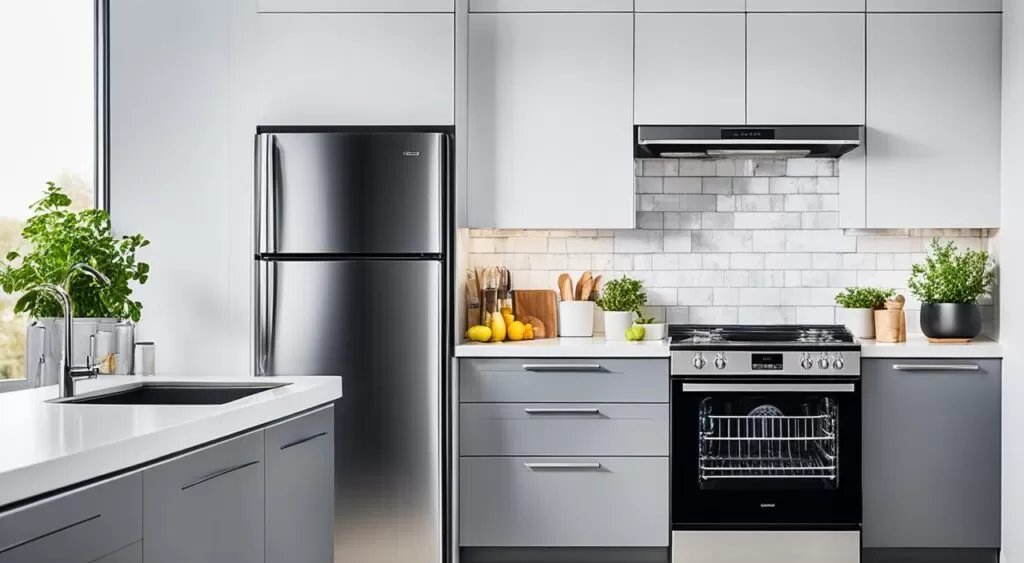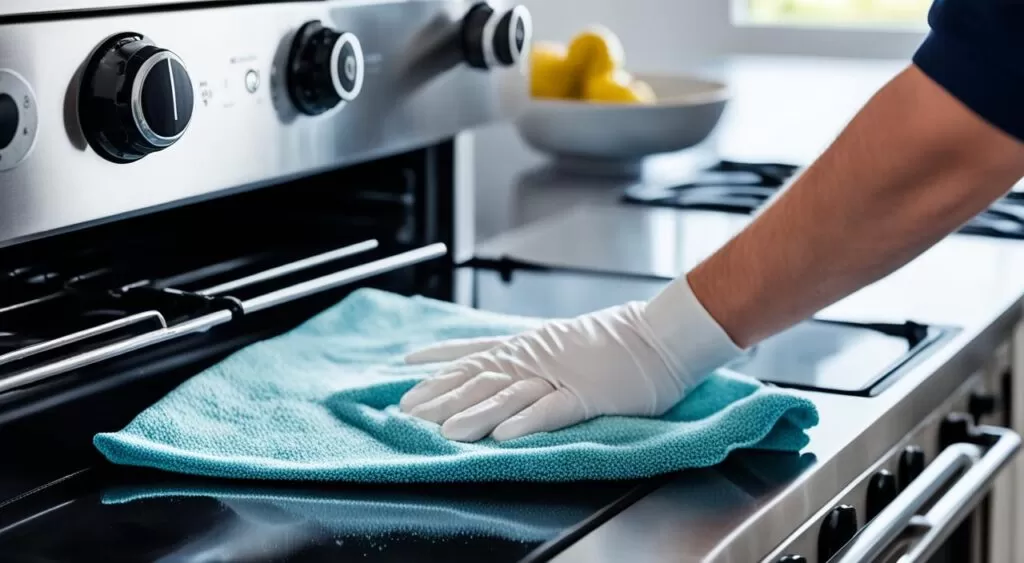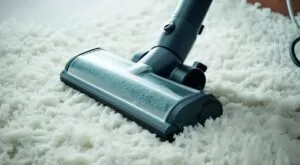Keeping up with a regular cleaning schedule is crucial for your kitchen appliances. This includes both deep cleaning and daily care, using the right tools and methods. Knowing how to clean your appliances helps prevent unexpected issues and high repair costs. Let’s go through some top tips and strategies for keeping your appliances in great shape.

Key Takeaways
- Utilize microfiber cloths to effectively clean stainless steel appliances without lint residue.
- Choose non-abrasive cleansers to maintain the integrity of stainless steel surfaces.
- For daily maintenance, water and a soft cloth are sufficient for a quick refresh.
- Implement a mixture of vinegar and water as a natural cleansing solution for various appliances.
- Apply rubbing alcohol or club soda for eliminating smears and fingerprints on stainless steel.
- Occasionally fill kitchen sinks with warm, soapy water to clean filters, preventing clogs and malfunctions.
- Adopt monthly microwave filter cleanings to alleviate grease build-up and sticky residue.
Understanding Appliance Maintenance: The Foundation for Efficiency
Efficiency and longevity in household appliances are closely linked. Keeping up with regular maintenance not only extends their life but also helps save energy. Energy conservation benefits from a smoothly running appliance that uses less energy and needs fewer repairs.
Why Regular Cleaning Is Crucial for Appliance Longevity
Following a refrigerator maintenance guide can keep your appliance running for years. Cleaning spills on your stove avoids hard-to-clean debris. This not only improves cooking but also prevents hazards. Keeping your food disposal unit free from debris avoids clogs and motor issues. Properly cleaning the refrigerator gaskets helps it seal better. This maintains the temperature and protects the cooling system.
The Role of Maintenance in Energy Conservation
Today, energy conservation, including tips like microwave cleaning hacks and a refrigerator cleaning checklist, is about living sustainably. The Department of Energy notes that appliances account for 12 percent of home energy use. Through regular upkeep and small innovations, we can reduce this. For example, making sure refrigerator temperatures are below 40 °F cuts energy waste and stops bacterial growth. This helps save the planet and our wallets.
- Checking appliance temperatures regularly with thermometers can save energy and keep food fresh.
- Using sealed containers for raw meat and rearranging shelves enhances airflow for efficient cooling.
- Cleaning appliances regularly prevents odors and bacteria, and using vinegar keeps it safe for food and families.
Following these maintenance steps is crucial for our appliances and the planet. It shows how consistent care supports energy-efficient living.
Refrigerator Maintenance Guide: Ensuring a Fresh Environment
Cleaning your fridge is key for food safety and preventing illness. With bacteria quickly growing at room temperature, a clean fridge is a must. A detailed refrigerator maintenance guide keeps your fridge working well and lasting longer.
Keeping your fridge below 40 °F stops bacteria from growing. Refrigeration has always been important for fresh food. Now, we have fridges with adjustable shelves and special drawers for better storage.
Don’t store perishable food in the fridge door; it’s warmer there. Clean up spills right away and throw out old food. Techniques from how to clean microwaves, like using vinegar or baking soda, can also keep your fridge smelling clean.
Manual defrosting needs to be done carefully to avoid food spoilage. Salmonella and E. coli cause many illnesses each year. Regular fridge maintenance can prevent these bacteria. It’s important to clean your fridge often, including the coils and vents, for better cooling.
- Remove and clean refrigerator coils periodically to prevent efficiency loss.
- Regularly clean fridge gaskets with warm water to ensure a tight seal.
- Keep the refrigerator level to prevent uneven wear and potential malfunctions.
- Use shallow containers for large amounts of leftovers to cool them quicker.
- Marinate food in the refrigerator, not on the counter, to avoid bacterial growth.
Cleaning your fridge regularly is crucial. Aim for a deep clean every season and handle spills and odors right away. Cool leftovers quickly and keep refrigerated items cold to stop bacteria growth.
| Foodborne Bacteria | Growth Prevention | Recommended Practices |
|---|---|---|
| Salmonella, E. coli O157:H7 | Refrigerator < 40 °F, Freezer at 0 °F | Cook food to safe internal temperatures |
| Clostridium botulinum (Botulism) | Refrigerate leftovers within 2 hours | Marinate foods in the refrigerator |
| Noroviruses, Shigella | Avoid room temperature over 2 hours for perishables | Discard perishables past storage limits |
By following these refrigerator maintenance guide tips, your fridge will be safe from bacteria. This keeps your food fresh and safe to eat.
Cleaning Appliances: How and when to clean items like microwaves and refrigerato
Keeping your appliances in top shape is more than just fixing them when they break. It’s about cleaning and caring for them regularly. Refrigerators and microwaves are used often, making appliance cleaning schedules essential. Adding kitchen appliance cleaning tips to your routine helps your appliances work well and last longer.
Developing a Schedule for Appliance Upkeep
Setting up a regular cleaning appliances schedule helps avoid surprises and keeps everything clean. For example, it’s good to deep clean refrigerators at least once a year. Chest freezers need appliance polish wax twice a year to protect them. Upright freezers should be cleaned with warm water and baking soda once a year to keep them smelling fresh.
Make an appliance cleaning schedule that includes light and deep cleaning. Here’s an easy cleaner recipe: ¾ cup of vinegar with 1 tablespoon of baking soda. This mix is a safe way to clean the outside and inside of your appliances.
Signs That Indicate Your Appliance Needs Attention
Even with regular care, your appliances might need extra attention. Watch for odd sounds, poor cooling, or loose door seals. These could be signs of bigger problems that, if ignored, could lead to expensive repairs.
Deep cleaning appliances require special focus on dirty spots. Clean your fridge inside out, including shelves and drawers. The outside needs cleaning too, especially around seals and coils. Using a microfiber cloth helps avoid streaks and ensures a clean finish.
For the microwave, take out the turntable and wash it separately. Use warm water and lemon juice for a natural cleaning solution. Wipe the inside carefully, focusing on air vents and door jams. A sponge with sudsy water helps remove stubborn spots.

The oven needs regular cleaning too, especially if you use modes like self-clean or steam clean. Clean spills and excess grease promptly. Clean gas cooktops with a soft cloth and a gentle cleanser. Glass or induction cooktops require special cleaners for tough spots.
To sum it up, a clean kitchen is key to a smooth-running home. Using the right cleaning appliances techniques and schedules is crucial. Follow these kitchen appliance cleaning tips to keep your kitchen ready for anything, from quick meals to big family events.
The Art of Cleaning Delicate Appliances Without Damage
Cleaning appliances like microwaves needs a careful touch. This helps avoid damage and makes them last longer. By using microwave cleaning hacks, you can save time and keep your appliances in top shape.
Always use microwave-safe dishes to avoid danger. Be gentle with the microwave door to prevent damage. Clean up spills right away to prevent hard-to-clean messes.
- A monthly cleaning of your dishwasher minimizes build-up from everyday detergents and minerals.
- Monitor the status of your dishwasher’s filters, cleaning them as needed based on your pre-rinse habits—weekly to monthly for routine loads, annually if you are diligent about pre-cleaning dishes.
- Check and cleanse the spray arms of the dishwasher to ensure optimal water flow and performance.
- After your oven cools, a simple dish soap and water blend can address light spills—anything heftier might call for a gentle abrasive cleaner.
Cleaning microwaves also means taking care of the grease filter. And pay attention to strange sounds that could mean it needs a check-up. For ovens and stovetops, let them cool before cleaning to prevent burns. Use gentle abrasives or a mix of baking soda and vinegar for tough stains.
3264 users have found these tips helpful. Sharing knowledge on cleaning appliance care is invaluable. Always cool down and turn off electronics like the Samsung Frame TV. Use proper cleaning materials to protect sensitive surfaces.
With the right microwave cleaning hacks and careful cleaning, our important appliances can stay in great shape. This saves time and money, and prevents damage from wrong cleaning practices.
Optimizing Dishwasher Performance Through Maintenance
Dishwasher maintenance boosts your appliance’s life and performance. Including appliance cleaning tips in your routine ensures a hygienic clean. It also enhances your machine’s efficiency. Regular deep cleaning is essential for spotless dishes and smooth dishwasher operation.
Adam Hofmann from GE Appliances highlights the importance of monthly filter cleaning. A clean filter prevents food particles from sticking to dishes. This effort can boost dishwasher efficiency by 15-20%.
Richard Tarrant advises against harsh cleaning on stainless steel components. Using mild solutions instead of bleach-based wipes avoids damage. This helps maintain the dishwasher’s functional sealing.
Eradicating Build-up: How to Keep the Dishwasher Sparkling
Experts say fighting build-up in dishwashers is a continuous effort, especially with hard water. They recommend a monthly citric-acid-based cleaner. Bosch suggests regeneration salt for hard water areas to avoid mineral build-up.
Finding and Cleaning Hidden Dishwasher Components
It’s important to clean every part of your dishwasher, including areas easy to overlook. Clean spray heads and soap dispensers to prevent clogs. Checking for leaks can also improve performance. Using tablets or packs might increase efficiency by 5-10%.
Different dishwasher settings can significantly impact cleanliness. Auto Wash or Sensor Wash settings adjust automatically, increasing effectiveness by 20-25%. The Heavy or Pots & Pans settings are great for tough stains, improving performance by 15-20%.
Consulting the owner’s manual helps select the best settings, potentially adding a 5-10% performance boost. Regular maintenance is crucial for keeping your dishes and kitchen in top shape.
Washer and Dryer: Preventative Measures for Major Appliances
Keeping a refrigerator maintenance guide and sticking to an appliance cleaning schedule can make a big difference. It’s true for your washer and dryer too, not just the fridge. This care keeps your appliances safe and working well for longer.
- When to clean: Cleaning your dryer’s lint screens and traps after each use is vital. It stops fires and makes the machine work better. It’s a simple step that keeps dangers at bay.
- Appliance Balance: Make sure your washer and dryer are perfectly level. This saves the motors and bearings from stress. When they’re balanced, you avoid early wear and breakdowns.
- Inspection: Regularly check hoses, gaskets, and electrical connections for wear. Early detection helps prevent bigger problems, like gas leaks or carbon monoxide risks in gas units.
Dryer checks are key parts of an appliance cleaning schedule. Untended issues like loose hoses or seals can be deadly, causing gas leaks or carbon monoxide problems. Cleaning fridge parts, like coils and drains, also matters. It keeps nasty bugs like E. coli and salmonella away.
Washer care is crucial too, like with the LG WM4000H. It’s a top pick because of its features and performance. Its smart features, like the LG ThinQ app, remind you to do maintenance. Applying refrigerator maintenance guide tips to your washer means it could last a decade without big repairs.
Keeping up with these tasks does more than just keep things clean. It’s also smart for protecting your big investment in home appliances. By sticking to maintenance schedules, you make your home safer and more efficient.
Microwave Maintenance: From Daily Upkeep to Deep Cleaning
Microwaves are a must-have in over 90% of American homes. They need regular care for safety and to last longer. Knowing how to clean your microwave every day and doing a thorough clean will keep it working well and your food safe.
Quick Microwave Cleaning Hacks for Daily Use
Keeping your microwave clean every day stops buildup and bad smells. Use microwave-safe covers to avoid splatters. Wipe the inside with a microfiber cloth after each use. This keeps it clean without much effort.
Remember: Microwaves can have “cold spots” where bacteria live because of uneven cooking. Cleaning it often makes sure your food is handled safely.
The Ultimate Microwave Deep-Cleaning Routine
For a deep clean, set aside 30 to 45 minutes and grab some household items. Start by heating a bowl of water with white vinegar for five minutes in the microwave. Let it sit for 10 more minutes to loosen dirt. Then, use a mix of dish soap and baking soda with a gentle sponge to scrub inside. For tough spots, a baking soda paste helps. Dry the outside with a microfiber cloth when you’re done.
Be safe when deep cleaning: Unplug the microwave, use pot holders to avoid burns, and pick safe cleaners to avoid food contamination.
| Cleaning Materials | Why Use It |
|---|---|
| White Vinegar & Water | Loosens stubborn residue with steaming technique |
| Microfiber Cloths | Ensures a gentle, scratch-free clean |
| Baking Soda | Deals with tough stains without harsh chemicals |
| Nonabrasive Sponge | Scrubs effectively without damaging surfaces |
After cleaning, make sure your microwave cooks food hot enough to kill bacteria. Following USDA’s recommended temperatures is key. Do not partially cook food in the microwave unless you plan to continue cooking it right away.
Using the right microwave-safe containers means your food stays free from toxins. This makes cooking not just clean but also safe. Keep up with regular and deep cleans to make your microwave a reliable tool in the kitchen.
Maintaining Air Conditioners and Heaters for Seasonal Transitions
When seasons change, following a refrigerator maintenance guide becomes essential. This guide is not just for your fridge but also for kitchen equipment. It includes crucial steps for deep cleaning kitchen appliances. Such care is vital for: Your appliance cleaning schedule, especially for air conditioners and heaters. They need attention to work well all year.
Regular check-ups and cleaning of your HVAC systems are key. Start with the filters. Check them weekly and clean them monthly. If not, efficiency could drop by up to 20%. Cleaning might need to be more often if you have new carpets or moved recently. Dust and debris hurt your appliances’ performance, so maintenance is crucial.
Do not forget the Room Cabinet. It can hide lint and debris. Vacuum it every 6 months to prevent problems. This simple step keeps material from gathering in the coils, which could cause damage when you need heating or cooling most. Both indoor and outdoor coils should be cleaned carefully every 6 months. Use mild cleaners to avoid things like compressor failure in outdoor units.
For cleaning the basepan, use mild detergents or Simple Green, then dry thoroughly. If you’re in a new place, make sure zonelines are clean to prevent dust issues. After cleaning any unit, check for any damaged or frayed wires. Replace them quickly to prevent problems.
If you see rust, work on it with a wire brush and sand. Then use rust-inhibiting paint to prevent future damage. Being proactive and careful keeps your appliances not just clean, but working well. This helps them manage extreme weather changes smoothly.
Creating a cozy home is about more than just a clean fridge or microwave. A good appliance cleaning schedule and upkeep for air conditioners and heaters prepare your home for any season. This ensures comfort without interruption and lowers repair costs.
Proactive Care for Oven and Range: A Guide to Spotless Cooking
Keeping your home spotless, especially in Santa Monica, means more than just tidying up. Tasks like how to clean microwaves or when to clean refrigerator are well-known. Yet, caring for your oven and range is just as important. It ensures a clean cooking experience and keeps your appliances lasting longer.
Spills on the stove should be cleaned right away. This keeps the surface smooth and working well. Using a special toothbrush to clean food from igniters and controls helps too. It keeps everything running smoothly by preventing buildup.
Combating Stove Spills to Maintain Pristine Surfaces
Kitchen cleaning is more than the occasional surface wipe. Setting a regular cleaning schedule helps tackle spills quickly. This approach keeps spills from becoming hard and difficult to clean, which could hurt your range’s look or function.
Using eco-friendly cleaning products is a good choice. It shows you care about the environment while keeping your kitchen clean. With the right tools, what seems tough becomes easy.
When to Recalibrate: Keeping Oven Temperatures Accurate
For those who love baking, a correct oven temperature is key. Avoid bad baking results by [checking your oven’s temperature often](#). Use a reliable thermometer to see if it’s accurate. If not, it’s time to recalibrate.
This check should be done now and then. It’s especially important after a lot of use or a self-clean cycle. These can sometimes make the oven less accurate.

Being proactive like using microfiber cloths and cleaning from top to bottom makes a big difference. Assign cleaning tasks to different days. This makes big jobs easier. Getting your family involved helps too.
Don’t forget about digital reminders for deep cleaning hard-to-reach spots. LG Proactive Customer Care is great for those with their smart appliances. It makes keeping track of cleaning schedules simpler.
In summary, looking after your appliances, like recalibrating your oven, is crucial for great cooking. Following these tips not only makes your appliances last longer. It also makes your kitchen a better place to cook.
Conclusion
Keeping your kitchen pristine and your appliances running longer starts with regular maintenance and deep cleaning kitchen appliances. We’ve shown you simple ways to make appliances last longer, work better, and use less energy. For example, boiling water in an electric kettle uses less energy than using the stove.
To keep everything working well, set up an appliance cleaning schedule. Make sure your fridge stays between 35°-38°F and your freezer at 0°F. This helps keep food safe and saves energy. Defrosting regularly stops frost from lowering your appliance’s efficiency. Stopping bacteria growth between 40°-140°F is crucial for food safety.
Cleaning your appliances properly is all about paying attention. If food goes bad, throw it out quickly. Store raw meat safely and clean up spills right away. Appliances are a big part of our lives. By using these tips, like cooking small meals in a toaster oven, our kitchens become safer and more eco-friendly. Let’s take pride in our homes by keeping our kitchens in top shape.
FAQ
How Often Should I Clean My Kitchen Appliances?
Clean microwaves every week and refrigerators every month. Clean ovens when spills happen. Don’t forget a yearly deep clean for all appliances.
Why Is Regular Cleaning Important for Appliance Longevity?
Regular cleaning stops grime and food particles from building up. This buildup can make appliances work too hard, leading to quicker wear out. Clean coils, filters, and gaskets to make appliances last longer.
Can Maintenance Really Save Me Money on Energy Bills?
Yes! Appliances that are well-kept use less energy. Cleaning fridge coils and making sure freezer vents are clear reduces energy costs.
What Should Be Included in a Refrigerator Maintenance Guide?
The guide should cover cleaning coils and door gaskets. Also, keep vents clear of food and defrost freezers to keep things running smoothly.
How Do I Develop an Appliance Cleaning Schedule?
Write down all your appliances and where they are. Figure out how often to clean each one, based on what their makers say and how much you use them. Then, set reminders for regular cleaning and care.
What Are Some Signs That My Appliance Needs Immediate Attention?
If your appliance makes strange sounds, works less well, leaks, or its doors won’t close right, it needs a checkup or a cleanup.
How Can I Clean Delicate Appliances Like Microwaves Without Causing Damage?
Use mild cleaners and soft cloths. For microwaves, steam cleaning with water and lemon helps. Stay away from strong chemicals and rough tools.
What Are the Best Practices for Dishwasher Maintenance?
Keep the filter clean, make sure spinning arms are clear, check the door seal, and sometimes run it empty with a cleaner to tackle buildup.
How Can I Maintain My Washer and Dryer to Prevent Breakdowns?
Don’t overload them. Clean the dryer’s lint screen after each use. Regularly check hoses for wear. Keeping machines level stops too much shaking and damage.
What Does Microwave Deep Cleaning Entail?
It means steaming with water and lemon, taking out and scrubbing the turntable, and wiping the inside with a mix of vinegar and water to fight tough stains.
How Should I Maintain My Air Conditioner and Heater When Seasonally Transitioning?
Replace or clean filters, vacuum inside parts, look for mold, and make sure everything’s working right before heating or cooling season begins.
When Should I Recalibrate My Oven Temperature?
Do it if cooking times or results seem off. Or, make it a yearly task. Check the temperature with a thermometer to be sure.
What Is the Best Way to Combat Stove Spills and Maintain a Pristine Surface?
Wipe up spills right after they happen to avoid them hardening. Use a toothbrush or soft brush for spots around igniters and knobs.





